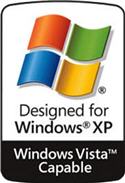Even Microsoft has trouble understanding what "Vista Capable" means

When a Microsoft manager can't clearly explain what "Vista Capable" means, you know that the whole "Vista Capable" and "Premium Ready" thing has gone too far and that marketing has gone too far.

"Capable is a statement that has an interpretation for many that, in the context of this program, a PC would be able to run any version of the Windows Vista operating system," said Mark Croft, the company's director of marketing. " 'Ready' may have [prompted] concerns that the PC would run in some improved or better way than -- than 'Capable,' therefore the word capable was deemed to be a more fitting word for this program."
Actually, "Vista Capable" was only an indicator that the system could run Vista Home Basic, the lowest-priced and lowest spec version of Vista.
[poll id=205]
Eventually, Croft corrected himself (presumably after his lawyers pointed out that he wasn't helping Microsoft's case by getting things wrong):
After a 10-minute consultation with Microsoft's lawyers, Croft corrected himself. "I made the statement that ... Capable would be able to run any version of Windows Vista, whereas, in reality, our intent with Capable was that the system would be able to run a version of Windows Vista," he said. "So quite an important difference in the two -- two terms there."
I never liked the whole "Vista Capable" and "Premium Ready" thing because if it wasn't deceptive, it was certainly confusing for consumers (who, let's face it, read as far as "Vista" and then switch off). In fact, I don't like Home Basic either because the whole thing feels deceptive to me this flavor of Vista feels like nothing more than a way for OEMs to push low-spec PCs that can barely run Vista onto unsuspecting consumers. I'm not a big fan of class-action lawsuits and such but Microsoft went too far here and deserves all the bad press that it's getting over this issue.
Just say no to "Vista Capable" and say no to Vista Home Basic.
Thoughts?